Seven Impossible Interviews Before Breakfast #54 (Winter Blog Blast Tour Edition): Jack Gantos
 November 8th, 2007 by jules
November 8th, 2007 by jules
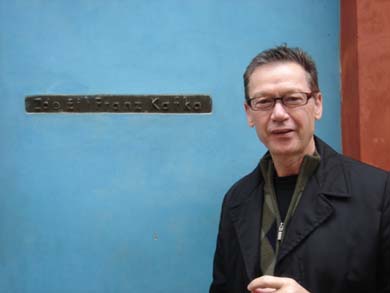
One More Note: This is our third entry in this week’s Winter Blog Blast Tour. To see the master schedule of all interviews this week, go here at Chasing Ray, and for today’s schedule of interviews, scroll to the bottom of this post. We will also be interviewing YA author Gabrielle Zevin tomorrow.
It is a real honor for me to feature today an interview with the one. the. only. Jack Gantos (pictured above at Franz Kafka’s house in Prague). I’m a big fan of his books and have had the great pleasure of hearing him speak several times (including taking a short course on picture books, which he taught one summer at The University of Tennessee). What can I say? If you’ve ever heard Jack speak, you know how quick-witted and honest and entertaining he is. To boot, he has a refreshingly irreverent sense of humor, which makes his books and his speaking engagements quite unforgettable. Above all, there’s his talent with the pen and the quality of his writing — his ability to bring such vivid stories and characters to life, stories that target every age range, from picture books to novels for adults.
And let me add that a good friend, Dr. Shannon Collins (who guest-wrote a Poetry Friday entry for us here at 7-Imp a few weeks ago — go to that wonderful post to read all about him), helped me compose a lot of these questions. He’s a Gantos fan as well and has had the pleasure of not only meeting him but even having a drink or two with him on occasion, chatting about life and reading and writing and all other such good topics. I am grateful to Shannon for contributing many of these well-worded questions as well as editing some of the ones I had already written myself. You can consider this interview his doing as well; if I could put a “by Jules and Shannon” up top this post, I would, but alas and alack, WordPress won’t let me. Thanks, Shannon!
Upwards and onwards then . . . As usual, if you don’t need a Jack Gantos 101 (hey, if I can evangelize Gantos to any readers, I’ll do my part), scroll down to the seven asterisks where the interview begins.
 As Jack’s bio at his site states, “the seeds for Jack’s writing career were planted in sixth grade, when he read his sister’s diary and decided he could write better than she could. He begged his mother for a diary and began to collect anecdotes he overheard at school, mostly from standing outside the teachers’ lounge and listening to their lunchtime conversations.” After deciding to become a writer in high school and then studying writing in college, he and illustrator Nicole Rubel began working on a picture book about a cat named Ralph, who is terribly fond of misbehaving, and it was the first in a series of numerous Rotten Ralph picture books. Rotten Ralph was published in 1976, so this impish feline’s been around a while. And, since that time, there have been a whole slew of (to be precise) picture books with Jack’s and Nicole’s irresistibly mischievious protagonist and Sarah, the girl who loves him — even a series of Rotten Ralph Readers, published by Farrar, Straus and Giroux, for fans of Ralph who are ready for early chapter books.
As Jack’s bio at his site states, “the seeds for Jack’s writing career were planted in sixth grade, when he read his sister’s diary and decided he could write better than she could. He begged his mother for a diary and began to collect anecdotes he overheard at school, mostly from standing outside the teachers’ lounge and listening to their lunchtime conversations.” After deciding to become a writer in high school and then studying writing in college, he and illustrator Nicole Rubel began working on a picture book about a cat named Ralph, who is terribly fond of misbehaving, and it was the first in a series of numerous Rotten Ralph picture books. Rotten Ralph was published in 1976, so this impish feline’s been around a while. And, since that time, there have been a whole slew of (to be precise) picture books with Jack’s and Nicole’s irresistibly mischievious protagonist and Sarah, the girl who loves him — even a series of Rotten Ralph Readers, published by Farrar, Straus and Giroux, for fans of Ralph who are ready for early chapter books.
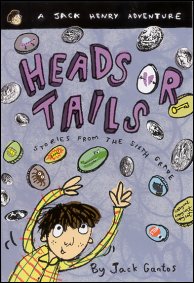
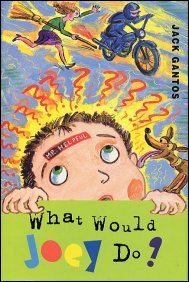 And then — since, again, Jack’s books can take you from cradle to grave, as his site puts it — there are his books geared at intermediate-aged readers. If you have read them, you know they are books you won’t soon forget: The Jack Henry books and the four Joey Pigza gems. As School Library Journal put it, the “first-person preadolescent musings and worries” that are the Jack Henry stories are “poignant, funny, and real.” Staring out with Heads or Tails: Stories from the Sixth Grade, Gantos introduced us to his semi-autobiographical tales of Jack Henry and his often-unpredictable life and family: “A book that reads like an improbably successful collaboration between Betsy Byars and William Sleator: funny but …weird!” wrote School Library Journal. They were followed by four more Jack Henry books, the most recent one published in 2003.
And then — since, again, Jack’s books can take you from cradle to grave, as his site puts it — there are his books geared at intermediate-aged readers. If you have read them, you know they are books you won’t soon forget: The Jack Henry books and the four Joey Pigza gems. As School Library Journal put it, the “first-person preadolescent musings and worries” that are the Jack Henry stories are “poignant, funny, and real.” Staring out with Heads or Tails: Stories from the Sixth Grade, Gantos introduced us to his semi-autobiographical tales of Jack Henry and his often-unpredictable life and family: “A book that reads like an improbably successful collaboration between Betsy Byars and William Sleator: funny but …weird!” wrote School Library Journal. They were followed by four more Jack Henry books, the most recent one published in 2003.
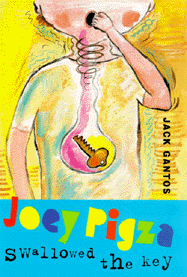 And then came Joey Pigza (“They say I’m wired bad, or wired sad, but there’s no doubt about it—I’m wired”). In Joey Pigza Swallowed the Key (1998, Farrar, Straus and Giroux), we met Joey, who has ADHD and trouble controlling his mood swings when his meds wear off. I saw Jack speak at the recent Southern Festival of Books, and there he stated that he read a lot as a child and saw no Joeys in those books. There was a “literature dryer filter,” he said. “All the Joeys would get caught in these things.” And by that, he said, he meant those smart, hyperactive students for whom the educational jargon over the years has changed: it’s gone from “active to willful to uneducable. Those kids had a taint,” he said. “You know those kids with the desk in the hallway?” Joey not only won the hearts of readers but Joey Pigza Swallowed the Key was also named a National Book Award Finalist and was named a School Library Journal Best Book of the Year. “In this roller-coaster of a ride, ingenuously and breathlessly narrated by Joey himself, readers are treated to an up-close introduction to life with attention deficit disorder — or being wired, as Joey puts it,” wrote the Horn Book review. “Readers of this compelling tragicomedy will know almost from the start that Joey’s not just a good kid — he’s a great kid.” In 2000, Gantos brought us Joey Pigza Loses Control, which was awarded a Newbery Honor, and followed it with What Would Joey Do? in 2002. Then — surprising us all with one more to follow after stating he would stop at a trilogy — this year brings us I Am Not Joey Pigza (Farrar, Straus and Giroux), which I recently reviewed here.
And then came Joey Pigza (“They say I’m wired bad, or wired sad, but there’s no doubt about it—I’m wired”). In Joey Pigza Swallowed the Key (1998, Farrar, Straus and Giroux), we met Joey, who has ADHD and trouble controlling his mood swings when his meds wear off. I saw Jack speak at the recent Southern Festival of Books, and there he stated that he read a lot as a child and saw no Joeys in those books. There was a “literature dryer filter,” he said. “All the Joeys would get caught in these things.” And by that, he said, he meant those smart, hyperactive students for whom the educational jargon over the years has changed: it’s gone from “active to willful to uneducable. Those kids had a taint,” he said. “You know those kids with the desk in the hallway?” Joey not only won the hearts of readers but Joey Pigza Swallowed the Key was also named a National Book Award Finalist and was named a School Library Journal Best Book of the Year. “In this roller-coaster of a ride, ingenuously and breathlessly narrated by Joey himself, readers are treated to an up-close introduction to life with attention deficit disorder — or being wired, as Joey puts it,” wrote the Horn Book review. “Readers of this compelling tragicomedy will know almost from the start that Joey’s not just a good kid — he’s a great kid.” In 2000, Gantos brought us Joey Pigza Loses Control, which was awarded a Newbery Honor, and followed it with What Would Joey Do? in 2002. Then — surprising us all with one more to follow after stating he would stop at a trilogy — this year brings us I Am Not Joey Pigza (Farrar, Straus and Giroux), which I recently reviewed here.
I said it in that review, and I’ll say it again: Could there be a more sympathetic, lovable character in middle-grade fiction today, I dare say?
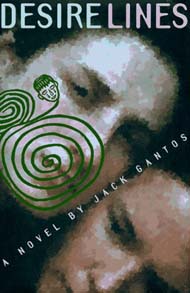 Gantos has also written three YA novels to date: Desire Lines, originally published in 1997, about sixteen-year-old Walker, who gets caught up in a witch-hunt against homosexuals; Hole in My Life, published in 2002, Jack’s Printz Honor autobiography describing the period of his life after graduating high school in which he spent time in prison for drug smuggling, all the while hoping to become a writer; and The Love Curse of the Rumbaughs, published just last year. In that novel, a young woman named Ivy, who made a shocking discovery in her small western Pennsylvania town when she was seven years old and learned a surprising secret nine years later, questions whether she has inherited the Rumbaugh curse of having excessive love for one’s mother. Booklist called it a “shocking, darkly comic tale” and School Library Journal, an “eerie, nearly perverse gothic tale of love and devotion gone completely and frighteningly haywire.” And, in their starred review, Kirkus Reviews described it as a “totally engaging, intelligently written work . . . This one will linger in one’s darkest corners.” And let’s not forget Jack’s adult novel, Zip Six (published in 1996), a jailhouse narrative, which Publishers Weekly said possesses “an irresistible quirkiness.”
Gantos has also written three YA novels to date: Desire Lines, originally published in 1997, about sixteen-year-old Walker, who gets caught up in a witch-hunt against homosexuals; Hole in My Life, published in 2002, Jack’s Printz Honor autobiography describing the period of his life after graduating high school in which he spent time in prison for drug smuggling, all the while hoping to become a writer; and The Love Curse of the Rumbaughs, published just last year. In that novel, a young woman named Ivy, who made a shocking discovery in her small western Pennsylvania town when she was seven years old and learned a surprising secret nine years later, questions whether she has inherited the Rumbaugh curse of having excessive love for one’s mother. Booklist called it a “shocking, darkly comic tale” and School Library Journal, an “eerie, nearly perverse gothic tale of love and devotion gone completely and frighteningly haywire.” And, in their starred review, Kirkus Reviews described it as a “totally engaging, intelligently written work . . . This one will linger in one’s darkest corners.” And let’s not forget Jack’s adult novel, Zip Six (published in 1996), a jailhouse narrative, which Publishers Weekly said possesses “an irresistible quirkiness.”
Allrighty. My Jack Gantos 101 is done. That was my cyber-version of standing on a street corner, evangelizing and chanting “Gantos! Read his books! Gantos! Read his books!” I’d like to thank Jack for taking the time to stop by 7-Imp, and thanks again to Shannon for his assistance with the interview questions. Without further ado, here’s Jack. Wicked cool.
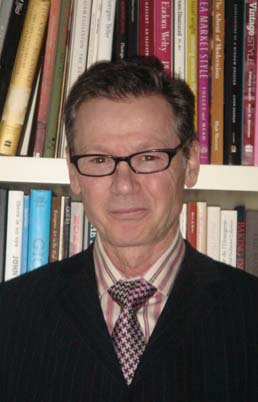 7-Imp: I know you’ve talked about this previously in online interviews, but for our readers who haven’t read about this, what was the process that led you to the creation of a fourth Joey book (I Am Not Joey Pigza) when the series was originally intended to be a trilogy? How did the book’s lovely theme of forgiveness, handled so expertly in the writing, come to you?
7-Imp: I know you’ve talked about this previously in online interviews, but for our readers who haven’t read about this, what was the process that led you to the creation of a fourth Joey book (I Am Not Joey Pigza) when the series was originally intended to be a trilogy? How did the book’s lovely theme of forgiveness, handled so expertly in the writing, come to you?
Jack: After I had finished the third Joey book I thought I had summed up the Pigza saga with Joey and his mother coming to terms, the grandmother passed away, and the father having driven off on his motorcycle. I next wrote a Jack Henry book and then wrote The Love Curse of the Rumbaughs. So I had put a lot of distance between what I was writing and the third Joey Pigza. I was writing yet another novel and was well into it when I began to show up each morning at the library with a little Joey Pigza scene playing out in my head. At first I thought I was just nostalgic for Joey and was simply entertaining myself with further Pigza events. But then when the scenes began to add up and connect into a narrative I thought I should write them down.
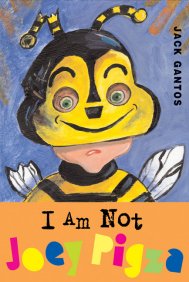 I write books by hand first in notebooks, so I just flipped to the back of my notebook and began to log the Joey material. Then I would flip back to the front end of my notebook and continue with the new novel. Day after day, this new Joey material began to gather and before long I had nearly as much Joey material as I had new novel material. This gave me pause. I didn’t want to write a new Joey book just because I missed the character, and so I began to investigate the thematic material for clues which would speak to character motivation. I typed up all the material and sorted it out and—to boil this answer down—I saw that it was about Joey needing to forgive his father for being such a crap father. Joey’s father is not a ‘poster dad’ for anyone so I didn’t really care if he wanted or needed forgiveness, but what I realized is that Joey needed to forgive his father because he had to get it off his chest. It seemed to me that Joey would be burdened by his anger toward his father, and as he grew older that anger could be emotionally corrosive—Joey could be consumed with bitterness for the man and it seemed unfair to have Joey, once again, be the victim of his father’s careless behavior. So it became clear that I had to write a book where Joey has the opportunity to forgive his father and thus inoculate himself from the bitterness which could infect his young heart.
I write books by hand first in notebooks, so I just flipped to the back of my notebook and began to log the Joey material. Then I would flip back to the front end of my notebook and continue with the new novel. Day after day, this new Joey material began to gather and before long I had nearly as much Joey material as I had new novel material. This gave me pause. I didn’t want to write a new Joey book just because I missed the character, and so I began to investigate the thematic material for clues which would speak to character motivation. I typed up all the material and sorted it out and—to boil this answer down—I saw that it was about Joey needing to forgive his father for being such a crap father. Joey’s father is not a ‘poster dad’ for anyone so I didn’t really care if he wanted or needed forgiveness, but what I realized is that Joey needed to forgive his father because he had to get it off his chest. It seemed to me that Joey would be burdened by his anger toward his father, and as he grew older that anger could be emotionally corrosive—Joey could be consumed with bitterness for the man and it seemed unfair to have Joey, once again, be the victim of his father’s careless behavior. So it became clear that I had to write a book where Joey has the opportunity to forgive his father and thus inoculate himself from the bitterness which could infect his young heart.
Also, on a personal note, I have always thought that ‘forgiveness’ is important in life, not just for the person who has done wrong, but for the person who has been wronged. Thus I felt that this book had to be written. I called my editor and went down to see him in New York and told him about the book and he instantly encouraged me to pause the other novel and go full speed ahead with the new Joey. So I took on this theme of forgiveness for Joey and I’m glad I did.
7-Imp: Teachers and librarians talk about hooking reluctant readers with your Joey, Jack, and Ralph books all the time. What do you think it is about these works that draw readers so deeply into the books’ story worlds and keep them coming back for more, especially when some adults would say that books such as these are too emotionally difficult for children to read?
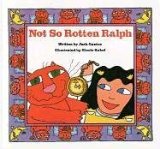 Jack (pictured below at the book release for I Am Not Joey Pigza): First, I think the books are written to be both fun and emotionally engaging. When a primary grade reader takes on Rotten Ralph I want them to have a good laugh while taking a look at Ralph’s world of rotten behavior and Sarah’s unconditional love, and then reflect on their own life. Do they receive unconditional love in their world? Or a grumpy threat? Or worse? If unconditional love is not present, then why? On the other side of the coin, does the reader suddenly realize that they are behaving like Rotten Ralph and have crossed some behavior boundaries and now need to make some personal changes? Perhaps the reader concludes that being rotten all the time pushes the limits of everyone’s patience. Or, perhaps the reader simply laughs his or her head off and enjoys the high jinks. One thing the Ralph books are not are handbooks of rotten behavior for kids, as a few misguided folks have labeled them over the years. Kids are smarter than that.
Jack (pictured below at the book release for I Am Not Joey Pigza): First, I think the books are written to be both fun and emotionally engaging. When a primary grade reader takes on Rotten Ralph I want them to have a good laugh while taking a look at Ralph’s world of rotten behavior and Sarah’s unconditional love, and then reflect on their own life. Do they receive unconditional love in their world? Or a grumpy threat? Or worse? If unconditional love is not present, then why? On the other side of the coin, does the reader suddenly realize that they are behaving like Rotten Ralph and have crossed some behavior boundaries and now need to make some personal changes? Perhaps the reader concludes that being rotten all the time pushes the limits of everyone’s patience. Or, perhaps the reader simply laughs his or her head off and enjoys the high jinks. One thing the Ralph books are not are handbooks of rotten behavior for kids, as a few misguided folks have labeled them over the years. Kids are smarter than that.
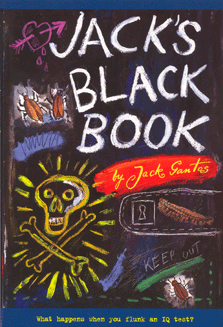 The Jack Henry stories are based on my life. I kept journals when I was young and wrote down the odds and ends of my days. I never threw my journals away, or lost them, and years later I pulled them off my shelf and reread them. Then I plucked out all the incidents and themes and characters and emotions which seemed to define my life and rewrote them. The Jack books have a great deal of domestic action running across the surface and a counterpoint of questions, emotions, insights, interpersonal challenges running just under the surface. As anyone knows in life, and in writing a good book, there is always the exterior physical world and the interior world of thoughts and emotions. If you don’t have some sort of dynamic conversation between these two worlds, then something is severely wrong—both in literature and in life. In the Jack Henry stories, Jack is generally trying to parse his physical and emotional world and come up with some truths about his family, community, school, self and the general world in which he lives. He is a reflective character—not terribly proactive—but definitely involved in the pursuit of a deeper layer of meaning in life beyond just the stimulus-response of the world of physical action. When I visit schools and speak to young readers and writers about the Jack books, I make certain to emphasize this all-important relationship between the external action and the internal reaction and/or internal action and external reaction.
The Jack Henry stories are based on my life. I kept journals when I was young and wrote down the odds and ends of my days. I never threw my journals away, or lost them, and years later I pulled them off my shelf and reread them. Then I plucked out all the incidents and themes and characters and emotions which seemed to define my life and rewrote them. The Jack books have a great deal of domestic action running across the surface and a counterpoint of questions, emotions, insights, interpersonal challenges running just under the surface. As anyone knows in life, and in writing a good book, there is always the exterior physical world and the interior world of thoughts and emotions. If you don’t have some sort of dynamic conversation between these two worlds, then something is severely wrong—both in literature and in life. In the Jack Henry stories, Jack is generally trying to parse his physical and emotional world and come up with some truths about his family, community, school, self and the general world in which he lives. He is a reflective character—not terribly proactive—but definitely involved in the pursuit of a deeper layer of meaning in life beyond just the stimulus-response of the world of physical action. When I visit schools and speak to young readers and writers about the Jack books, I make certain to emphasize this all-important relationship between the external action and the internal reaction and/or internal action and external reaction.
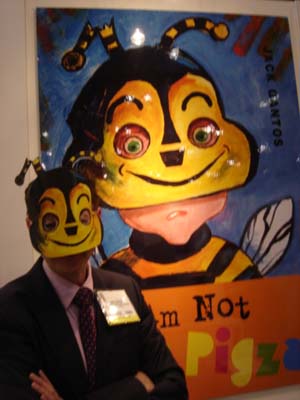 Joey Pigza is perhaps the most challenging, because he has the most unrelentingly active life (he’s ADHD) within himself and without. His family exacerbates his condition. His father is absent at times, and when he is around he is a bit of a crackpot, and sometimes a menace. His mother is inconsistent—kind and caring toward Joey when she is contrite about her careless mothering, but then she can also be very self involved and drift away from being the parent Joey needs. His grandmother is supportive. She can be a tough customer to live with. She is grouchy and self serving—but her love for Joey wins out and she provides him with the solid values he lives by. The world he inhabits seems out of control and at times it is, but it is not a world which is unknown to a great many children. Some children recognize the family life Joey has to navigate—some don’t. But all the children understand Joey’s heart because despite his circumstances and his ADHD he has the desire to be loved and the enthusiasm to love others. He often makes mistakes, but he wants to do better, and does. He frequently lacks focus in his life, while wanting to learn how to stay on task. The constant circular coming and going of his family members and their unreliable behavior, mixed with his struggle to control his ADHD, make being Joey Pigza a very tough job. But he has a great sense of humor, and is very smart, and has a big heart and limitless energy and ultimately he will find his way in the world.
Joey Pigza is perhaps the most challenging, because he has the most unrelentingly active life (he’s ADHD) within himself and without. His family exacerbates his condition. His father is absent at times, and when he is around he is a bit of a crackpot, and sometimes a menace. His mother is inconsistent—kind and caring toward Joey when she is contrite about her careless mothering, but then she can also be very self involved and drift away from being the parent Joey needs. His grandmother is supportive. She can be a tough customer to live with. She is grouchy and self serving—but her love for Joey wins out and she provides him with the solid values he lives by. The world he inhabits seems out of control and at times it is, but it is not a world which is unknown to a great many children. Some children recognize the family life Joey has to navigate—some don’t. But all the children understand Joey’s heart because despite his circumstances and his ADHD he has the desire to be loved and the enthusiasm to love others. He often makes mistakes, but he wants to do better, and does. He frequently lacks focus in his life, while wanting to learn how to stay on task. The constant circular coming and going of his family members and their unreliable behavior, mixed with his struggle to control his ADHD, make being Joey Pigza a very tough job. But he has a great sense of humor, and is very smart, and has a big heart and limitless energy and ultimately he will find his way in the world.
Overall, I think young readers return to my books, because they are a combination of physical and emotional events. If the books are just a physical romp, then the reader senses the emotional void in the character and text. If the books are just an unrelenting emotional spree, then the reader tires of not having the physical world of the story in which to move them forward. There has to be a balance—and any young reader with common sense will know this instinctively.
7-Imp: You said in this ’06 interview, “{t}he language in Joey Pigza is … geometric, athletic and multifaceted and comes at the reader on springs.” How do you channel this boy and nail his language and thought processes so well? Does it take tons of preparation and “getting into character,” if you will? I guess this question wants to be a “process” question: Tell us about your writing process, particularly for the Joey books (and starting wherever you like: getting the idea, starting to write, under deadline, etc.). Do you outline plot before you write or just let your muse lead you on and see where you end up?
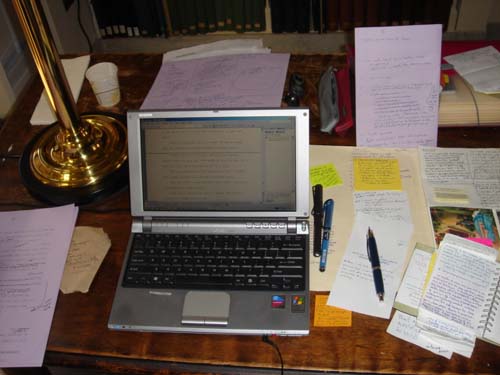
Jack: Like all my books, I write them in bits and pieces. I don’t begin with the first sentence first and the second sentence second and so forth. I allow for the serendipitous writing moment to catch me by surprise so—with Joey—this means that I’m just gathering up scenes and out-takes which I allow to float freely about in a loose manuscript before I begin to press them for thematic similarities, action sequences, emotional reactions and plot work. Once I begin to gain a more articulate sense of what the book is about then I can consciously manipulate the action to worry the emotions–or elevate the emotions—while teasing out the plot so that the theme is fully revealed.
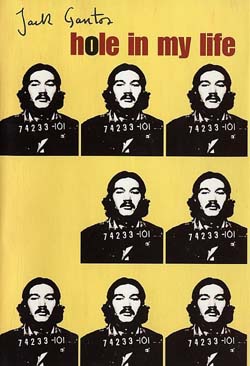 7-Imp: Your memoir Hole in My Life chronicles your journey through the United States correctional system as well as your deeper journey of becoming a full-time writer. For those who haven’t read the book, can you talk a bit about how that experience “moved {you} from wanting to be a writer to writing” (as described at your site)? What experiences stand out to you the most when you think back to that slice of your life?
7-Imp: Your memoir Hole in My Life chronicles your journey through the United States correctional system as well as your deeper journey of becoming a full-time writer. For those who haven’t read the book, can you talk a bit about how that experience “moved {you} from wanting to be a writer to writing” (as described at your site)? What experiences stand out to you the most when you think back to that slice of your life?
Jack: Well, this a hard question to answer in depth because since I was a young reader I’ve had an interest in books. As I grew older—teen—I wanted to become a writer, but I hadn’t the confidence to do so. I hadn’t any instruction in school when it came to writing, and I was unable to teach myself—I didn’t have the ability nor the discipline to figure it out. So it was frustrating to feel both that I didn’t receive the education and support, and that I couldn’t work it out myself. There was really no one to blame, but I felt pretty beaten down because I wanted to write. Of course, it wasn’t long before I felt that I didn’t have what it takes to create. When I went to prison after high school, I felt pretty low. I had no writing. No freedom. No confidence and a very uncertain picture of where my life was heading. But I kept reading and I think that sustained me, because books had a dynamic effect on what I thought and how I felt. In prison, I wrote a lot of letters and I kept a journal of my experience—an experience which was rich in both story and emotional material. A lot of writers had been to prison and written about it and so I followed their lead. I had read that Hemingway encouraged young writers to join the army and go to war so they would have something to write about. I didn’t want to go to war (Vietnam at the time), but since I was in prison, I figured writing about it gave me the content—and once I supplied the discipline (plenty of time in a cell) then I began to gain some traction.
After I was released, I went to college for creative writing and that gave me the instruction and time to push my doubts aside and get my work done.
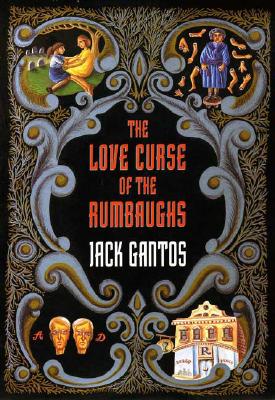 7-Imp: The Love Curse of the Rumbaughs contains powerful prose to which Gantos readers are accustomed: e.g. “I had turned toward my mother to whisper these questions in her ear when I saw she was crying. Her open eyes were like shards of ice melting.” On the other hand, you tackle some unconventional topics (eugenics, taxidermy, hints of incest) in a darkly comic way. What were some of the internal/external events in your life that led to the creation of The Love Curse (a book many love but often describe as “freaky, man”)?
7-Imp: The Love Curse of the Rumbaughs contains powerful prose to which Gantos readers are accustomed: e.g. “I had turned toward my mother to whisper these questions in her ear when I saw she was crying. Her open eyes were like shards of ice melting.” On the other hand, you tackle some unconventional topics (eugenics, taxidermy, hints of incest) in a darkly comic way. What were some of the internal/external events in your life that led to the creation of The Love Curse (a book many love but often describe as “freaky, man”)?
Jack: I wish I could rewrite this book. I’m cursed with it so much I don’t want to let it go. I’m itchy to do another edition. I’d keep all of what makes the book what it is, but I’d add another sympathetic theme—a theme I had earlier in the book but it was thought it was too far-reaching and so it was scrubbed out: the theme was that it is far greater to work for social and physical equality and live out perfection on earth than it is to wait for the unspecified perfection and equality in the afterlife. This theme would twine well with the eugenics movement (which was after physical perfection), and many other social, scientific and religious movements.
Science has encroached on theology, and faith in the unknown afterlife is beginning to seem all the more archaic. And too, realistic people believe that we should work toward creating a world where people’s needs are met. I think the notion of what perfection means to people needs some deep examination and if this book ever goes out of print (which is unlikely, because this book has its own fan club), I’ll take another crack at it. (To be fair to this book, each time I pick up any of my books I also pick up a pen and immediately begin to make changes and add new elements. I have a constant desire to force a book to repeatedly update its wardrobe).
7-Imp: For those who have not had the privilege of attending one of your speaking engagements or school events, you often share how you constantly keep a journal, show some of your past journals, and encourage everyone to do the same. You also demonstrate how you cultivate story ideas by drawing a map of your home and/or neighborhood and labeling it with events that come to mind. The result is many audience members (kids and adults) easily launch into writing their own stories when writing was something they thought they could not do. If you could change one thing about the way in which writing is taught in school (in, say, your “average” public school), what would it be?
Jack: I do visit a good number of schools each year and work with teachers and students on writing. For almost twenty years, I taught creative writing at Emerson College in Boston. I enjoyed teaching—had wonderful students—was allowed to teach a very wide range of literature from children’s books to Russian Lit in translation and everything in-between. When I gave up my tenured position in 1995, I still had the love of teaching. I had always visited schools when time allowed, and now that I had more time I added more school visits to my schedule. I’ve probably visited over 500 schools.
If I had to change anything with regard to how writing is taught, the change would first begin in the colleges where the teachers are taught. I am very supportive of the teachers, and when you examine the courses they took in order to receive their Education degree you seldom see any instruction in creative writing. Now, it makes simple sense that a teacher who does not feel confident with their own creative writing is not going to feel confident teaching it. So teachers need more instruction and inservice, and also they need to have time in their day to implement a writer’s workshop. Creative writing, like all writing, can only improve when practiced repeatedly.
Every school wants their students to write better. But in order to make this happen teachers need more support and schools need to make room for writing in their daily curriculum. The solution is obvious. The will to implement the solution is lacking.
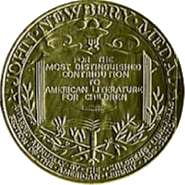
 7-Imp: As book nerds who love to read, read reviews, read about awards, and generally read about All Things Books (but not novelists ourselves), we sometimes wonder what is it like to write, knowing the amount of publicity an award book brings. And, especially knowing that young adults are not the ones actually granting the awards, what effect do you think awards have on YA authors’ writing, if any?
7-Imp: As book nerds who love to read, read reviews, read about awards, and generally read about All Things Books (but not novelists ourselves), we sometimes wonder what is it like to write, knowing the amount of publicity an award book brings. And, especially knowing that young adults are not the ones actually granting the awards, what effect do you think awards have on YA authors’ writing, if any?
Jack: Well, no matter what age group you write for, a major award really helps. There are about 16,000 children’s books published each year, so getting some attention for your book is pretty difficult. The awards don’t make your book better, but they attract readers. Book stores have “award sections”—teachers have “award collections” in their classrooms—libraries often have a display of award winning books–parents feel that if a book has an award sticker on it, then it is a read of consequence. As a writer, the award gives you a little more room to stretch out and take on material that might otherwise be ignored when published. An award helps sell books and pleases your publisher and allows them to justify a larger publicity and marketing budget. So receiving awards for your book is great for the book and your reputation as a writer.
And one more point: young adults are often encouraged to read ancient classic and modern classic adult literature—literature that will give them a leg-up in college—so winning a young adult award like the Printz allows a teen to feel that it is okay to read a book that is written for their own age group without having to be criticized for reading less significant “children’s literature.”
7-Imp: Do you think you have any more picture books in you? We know you have much enthusiasm for, not only a well-done picture book, but also the Great Ones of the past and their creators (Sendak and James Marshall, to name a couple). This question may be entirely unfair and/or too hard to answer, but we’re curious: What do you think some of the outstanding picture books of late have been? Or even some of the more promising authors and/or illustrators?
Jack: Well, this is an impossible question to answer. There are a lot of great picture books. But I remember when creators like Jim Marshall were considered to be “cartoonists” (which was meant as an insult by the arbiters of pure picture books). Comic books used to be considered trashy reading. Now we have the illustrated novel and it is highly regarded. Tastes change. Trends change. The criteria for excellence changes.
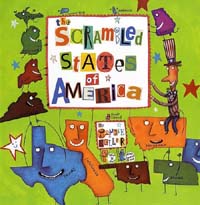
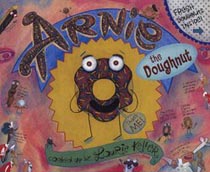 Yes, I’ll write other picture books beyond Rotten Ralph. But I think if I could write a picture book as fabulous as Laurie Keller’s Arnie, the Doughnut, I would be very satisfied. She has written and illustrated some great books that have not won major awards, and this puzzles me. I think her work has been overlooked. How can you not fall in love with Kansas in The Scrambled States of America or not laugh your way through Open Wide: Tooth School Inside.
Yes, I’ll write other picture books beyond Rotten Ralph. But I think if I could write a picture book as fabulous as Laurie Keller’s Arnie, the Doughnut, I would be very satisfied. She has written and illustrated some great books that have not won major awards, and this puzzles me. I think her work has been overlooked. How can you not fall in love with Kansas in The Scrambled States of America or not laugh your way through Open Wide: Tooth School Inside.
7-Imp: Did you or do you get any flack from parents complaining about Rotten Ralph’s “bad behavior,” not understanding that Ralph (like a lot of other wonderfully mischievous picture book protagonists) can serve as an outlet for a child’s inherently “rotten” side which can still be rewarded with that type of unconditional love Ralph gets from Sarah?
Jack: Of course I receive flack from parents and teachers who gripe that Ralph is not contrite enough. It troubles some people that Ralph receives unconditional love instead of unconditional punishment. But this is an old issue. I have defended Ralph for so long that now I’m beaten down—when someone begins to complain to me about Ralph I just—as politely as I can—beg them not to read the book to their child. Instead, I encourage them to read something like Curious George, where George, after he misbehaves, is locked up in a zoo for causing trouble. I suppose if Sarah dragged Ralph off to the animal shelter and abandoned him for being incorrigible, then some people would feel better about the book’s message.
7-Imp: Few writers have successfully written and published for the range of audiences that you have. You talk about how good writing always begins with good reading, which means you’ve done some seriously good reading. As a book lover speaking to other book lovers, what books and/or authors had an especially significant impact on you as an early reader?
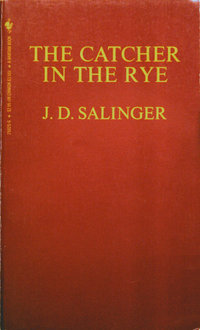 Jack: When I was very young, I read Golden Books. I’m sure The Pokey Little Puppy was a favorite. And I read whatever I was told to read. As I got older, I read all the books my big sister read because she was a great reader and very smart. By the time I was in middle school, I read my parents’ books. My dad read war novels and I read what he read—including all the eye-popping scenes of sailors on shore leave in Singapore. But books like Lord of the Flies, Nineteen Eighty-Four, The Catcher in the Rye, On the Road, Stop-Time, Revolutionary Road—books like this really spoke to me personally. I wasn’t just reading these books—I was having a private conversation with these books.
Jack: When I was very young, I read Golden Books. I’m sure The Pokey Little Puppy was a favorite. And I read whatever I was told to read. As I got older, I read all the books my big sister read because she was a great reader and very smart. By the time I was in middle school, I read my parents’ books. My dad read war novels and I read what he read—including all the eye-popping scenes of sailors on shore leave in Singapore. But books like Lord of the Flies, Nineteen Eighty-Four, The Catcher in the Rye, On the Road, Stop-Time, Revolutionary Road—books like this really spoke to me personally. I wasn’t just reading these books—I was having a private conversation with these books.
7-Imp: Are you working on any new projects that you can tell us about? Will there be any more Jack stories for your fans?
Jack: I’m working on a series of books that are making me very uncomfortable, which is a good sign. When I write a book that I think everyone is just going to love, then I know I’m on the wrong track. As for more Jack Henry books—I think that set of five books is finished. But you never know. I might have a brain hemorrhage that leaves me stranded in my third-grade memory and then I’ll write a Jack book set in that grade.
7-Imp: You’ve talked before about how the average person on the street believes that children’s book authors and illustrators live in little pink bubbles (you worded it much better than that, but that was the general idea) -– that they’re all sweetness and light and only want to write about/illustrate cute, wittle bunnies and such. Do you think that perception is changing?
Jack: Oh, yes. That perception has changed entirely. Look at Dan Handler, or Jon Scieszka, or J.K. Rowling. They’ve busted the pink bubble mold forever. We should all be grateful to them.
7-Imp: What’s one thing that most people don’t know about you?
Jack: I lie more to myself than to others.
7-Imp: If you could have three (living) authors — whom you have not yet met — over for coffee or a glass of rich, red wine, whom would you choose?
Jack: Denis Johnson, Cormac McCarthy, Harper Lee–and a taxidermed Flannery O’Connor.
7-Imp: Is there something you wish interviewers would ask you – but never do? Feel free to ask and respond here.
Jack: “I prefer not,” said Bartleby.
7-Imp: What is your favorite word?
Jack: “Impunity.”
7-Imp: What is your least favorite word?
Jack: “Gifted-and-talented.”
7-Imp: What turns you on creatively, spiritually or emotionally?
Jack: Sniffing the end papers of a great new book before I read it at about 5 a.m.
7-Imp: What turns you off?
Jack: About 15,700 of the 16,000 children’s books published each year.
7-Imp: What is your favorite curse word? (optional)
Jack: The one I’ll use when I spot one of my stupid mistakes in this interview.
7-Imp: What sound or noise do you love?
Jack: Cat purring.
7-Imp: What sound or noise do you hate?
Jack: Finger closed in a car door.
7-Imp: What profession other than your own would you like to attempt?
Jack: Dictator.
7-Imp: What profession would you not like to do?
Jack: Pollster.
7-Imp: If Heaven exists, what would you like to hear God say when you arrive at the Pearly Gates?
Jack: “Shaken? Or stirred?”
For more online information on Jack Gantos:
- Jack’s official web site
- “Children’s Bookshelf Talks with Jack Gantos” by Sue Corbett; Publishers Weekly; September 6, 2007.
- “Meet Jack Gantos”; Interview at BookPage; September 2007.
- Interview at DownHomeBooks.com; May 2006.
- “The Follower” by Jack Gantos from Guys Write for Guys Read, edited by Jon Scieszka; at “‘Guys Read’: Encouraging Boys to Love Books”; “All Things Considered,” NPR; May 12, 2005.
- “Filling Holes with Words: An Interview with Jack Gantos” by Joel Shoemaker (interview excerpt at VOYA OnLine); June 2003.
- “An Interview with Author Jack Gantos“; Embracing the Child at the release of What Would Joey Do?
- “Jack Gantos: On Domestic Craziness and Big-Hearted Kids” by Gail P. Gregg; The ALAN Review: Volume 28, Number 2; Winter 2001.
- “Jack Gantos: Author Program In-depth Interview” (.pdf file); TeachingBooks.net; August 14, 2001.
- “Q&A with Jack Gantos” at skateboardmom.com; 2001.
- Interview at Kids at Random House at the release of Joey Pigza Loses Control.
- “Jack Gantos: Creativity and structure” by Ian Elliot; Teaching Pre K-8 (link is via findarticles.com); March 1996.
- “Writing What I Know & Finding Joey Pigza” by Jack Gantos at Scholastic.com; Undated.
Winter Blog Blast Tour interview schedule for Thursday, November 8, 2007:
- David Mack at Chasing Ray
- Paul Volponi at The Ya Ya Yas
- Elizabeth Knox at Shaken & Stirred
- Ellen Emerson White at A Chair, A Fireplace & A Tea Cozy
- David Levithan at not your mother’s bookclub
- Micol Ostow at Bildungsroman
- Laura Amy Schlitz at Miss Erin
- Kerry Madden at Hip Writer Mama
- Sherman Alexie at Interactive Reader

[…] 7 Imp’s WBBT interview of Jack Gantos, […]
I like that question about what interviewers never ask but you wish they would 😉
Thanks for this great interview! I was a student at Emerson when Jack was teaching, but alas, I could never get into his Children’s literature class! I saw him years later at a conference once I became a school librarian and was just crushed again that I never did get to have him as a teacher! If you have not read Hole in My Life – go RIGHT NOW and get yourself a copy!
Seriously, though, I love the photo of his writing desk. I’m going to print it out and show it to my wife the next time she asks me how I could possibly write “with all those notes lying around.” Indeed!
His desk is way neater than mine.
I think I’ve said it here on the blog before, but I LOVED Hole in My Life. I’m thinking of declaring Gantos month at my house so I can get caught up with the rest.
Thanks, Kathy!
David, I’m still amazed he writes everything out in longhand first — and then types it.
Sara, start with the first Joey Pigza book. I think I told you before that you’ll be wow’ed (and you’re probably thinking, yeah right. I’ll get to that once Jules gets to the book I loaned her) 🙂
“The world he inhabits seems out of control and at times it is, but it is not a world which is unknown to a great many children.”
Amen to that.
Also, his favorite sound is a cat purring? Awwww. That’s sweet.
Awesome author.Awesome Interview.
I’m off to get my girls journals…
Wow. Wow. Wow. Awesome interview.
Jules,
Fabulous interview! I love Jack and his books. I, too, have heard him present several times–twice for my reading council. One never gets bored when Jack speaks. He’s funny as a stand-up comedian–but always has meaningful things to say about literature and life.
Lovedit, loved it, loved it. Especially his comments about teaching writing in schools and what he woulddo wit The Love Curse….Thanks.
Oh, this was heaven.
I had to read this interview aloud to all the family here in the room as they also inherited the Gantos-fan gene.
The answer with Curious George is just perfect. I am still laughing over that answer.
The Pivot question answers were wonderful.
I was thrilled for you when I saw the schedule for the WBBT because I knew you are an uber-fan like me!
Thanks, everyone. Yes, Camille, I meant to email you and make sure you knew about this, seeing as how you and I were planning on our Gantos Fan Club, right? Hoo hah! We’ll be co-presidents, rule the world, and make his books requisite reading for all.
i like your book joey pigza swallowed the key.
i didn’t like ur book at all it pick on physically challanged children and i dont think it was a v ery good choice of words and actions
I couldn’t stop crying last night while I was listening to Joey telling about why he wanted to have a dog. Joey remineded me of my childhood when I was waiting for my mom.
What would you say Joey pigza looks like?
PS i am doing a book report on Joey pigza loses control.
I read The Book Hole In My Life, i liked it a lot.
I have a question,
Do you still pick at your face like you used to?
dude, your books rock!! your number (1)
i louv the book joey pigza swalled the key!!
hi i like your book joey pigza swallowed a key it is good
I have recently finished Joey Pigza swallowed a key and i’m partway through Joey Pigza loses control.
I must say that thse books are fabulous and i hope to see more!
Eddie age:10
you came to our school i t hought u were great
[…] Readers of 7-Imp With Good Memories may recollect that, back in November of ‘07, author Jack Gantos stopped by and sung the praises of author/illustrator Laurie Keller. Well, what […]
love ur books
i love u
you should come to are school jack we read your book it was one of the best books i have ever read the book hole in my life
hi
I love the books you made like the scrambled states of america and arnie the doughtnut! I love all of your books! You rock my sox and world!
you have some interesting books. you shou;d write book of Joey swallowing a rainbow. and he needs to get it out of him. You should really do my idea you won’t regete it…
i love the book arine the douhnut lol lol lol !!!!!!!!!!!
jack your a great author and you inspire especially me I’m warped into the hole in my life I will definitely take everything in that book to heart thats the greatest book ever
How old is Joey in Joey Pigza Loses Control?
i love your book joey pigza swallowed a key
[…] I’ll never forget Jack Gantos’ answer to the pearly-gates question – “Shaken or stirred?” – or, oh! Adam Rex’s: “I’m going […]
you’re the best Jack Gantos..woohooo!you’re coming to my school on october 4-6.can’t wait. (Nido De Aguilas)
[…] Jack Gantos, Rich Michelson, Steven Withrow: A good time will be had, as evidenced below. Plus, words cannot adequately express what good, smart people run the Center for Children’s and Young Adult Literature and public library over there in Knoxville. See you there, I hope. […]
[…] Children’s and Young Adult Literature (CCYAL) at UT was wonderful and invigorating. Author Jack Gantos was a great speaker, as always. (He is wicked funny.) And, for the first time, I got to meet Steven […]
[…] visited in 2007 as well, and that interview is here. That would be when he said, after I asked what he’s working on next, “I’m working on […]
[…] goes a little like this: Whenever author Jack Gantos very simply either writes or speaks, cyberspace chatter amongst myself, blogger/public librarian […]
he is hot
[…] Volponi at The Ya Ya YasEllen Emerson White at A Chair, A Fireplace and A Tea CozyJack Gantos at Seven Impossible Things Before BreakfastDavid Levithan at Not Your Mother’s Book Club Micol Ostow at Bildungsroman (who was here […]
PG SOFT Gaming – best slot online in the Philippines
better than jili slot and bingo plus
free Spins 3000+ Free Demo Slot
searching pggaming.org on Google or Bing to get free coins for play
https://ppgaming.org/
Just finding out about Gantos in 2025 can’t believe I went my entire existence not knowing who this man is. Amazing author